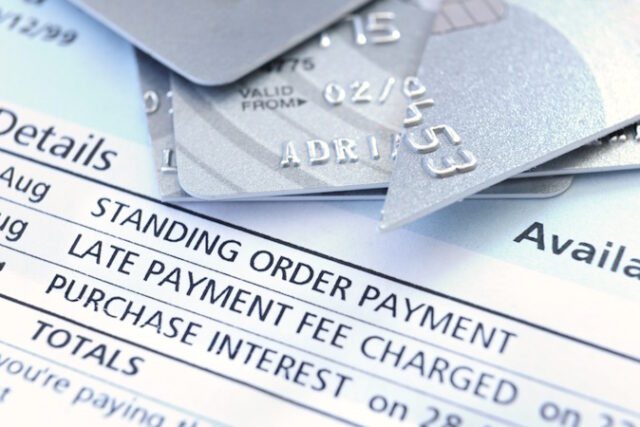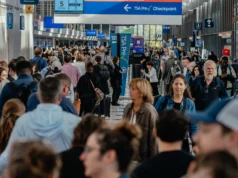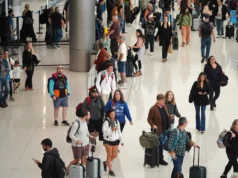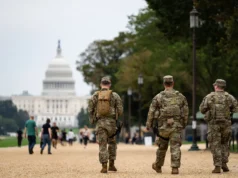
WASHINGTON (AP) — The Biden administration announced a rule Tuesday to cap all credit card late fees, the latest effort in the White House push to end what it has called junk fees and a move that regulators say will save Americans up to $10 billion a year.
The Consumer Financial Protection Bureau’s new regulations will set a ceiling of $8 for most credit card late fees or require banks to show why they should charge more than $8 for such a fee.
The rule would bring the average credit card late fee down from $32. The bureau estimates banks brought in roughly $14 billion in credit card late fees a year.
“In credit cards, like so many corners of the economy today, consumers are beset by junk fees and forced to navigate a market dominated by relatively few, powerful players who control the market,” said Rohit Chopra, director of the bureau, in a statement.
President Joe Biden planned to highlight the proposal along with other efforts to reduce costs to Americans at a meeting of his competition council on Tuesday. The Democratic president is forming a new strike force to crack down on illegal and unfair pricing on things like groceries, prescription drugs, health care, housing and financial services.
The strike force will be led by the Justice Department and the Federal Trade Commission, according to a White House statement.
The Biden administration has portrayed the White House Competition Council as a way to save people money and promote greater competition within the U.S. economy.
The effort appears to have done little to help Biden politically ahead of this year’s presidential election. Just 34% of U.S. adults approve of Biden’s economic leadership, according to a new survey by The Associated Press-NORC Center for Public Affairs Research.
“It will decrease the availability of credit card products for those who need it most, raise rates for many borrowers who carry a balance but pay on time, and increase the likelihood of late payments across the board,” Scott said.
Rob Nichols, the CEO of the American Bankers Association, said the CFPB “relied on flawed assumptions and a mischaracterization of the important role late fees play in promoting responsible consumer behavior.”
The U.S. Chamber of Commerce said it will file a lawsuit to try to prevent the federal agency from capping late fees at $8.
“The Consumer Financial Protection Bureau has exceeded its authority,” said Neil Bradley, the chamber’s executive vice president and chief policy officer. “The agency’s final credit card late fee rule punishes Americans who pay their credit card bills on time by forcing them to pay for those who don’t.”
Further, more Americans are falling behind on their credit card debts as well. Delinquency rates at the major credit card issuers such as American Express, JPMorgan Chase, Citigroup, Capital One and Discover have been trending upward for several quarters. Some analysts have become concerned Americans, particularly poorer households hurt by inflation, might be taking on too much debt.
“Overall, the consumer is credit healthy. However, the reality is that there are starting to be some significant signs of stress,” said Silvio Tavares, president and CEO of VantageScore, one of the country’s two major credit scoring systems, in an interview last month.
This is not the first time policymakers have weighed in on credit card fees. Congress in 2010 passed the CARD Act, which banned credit card companies from charging excessive penalty fees and established clearer disclosures and consumer protections.
The Federal Reserve issued a rule in 2010 that capped the first credit card late fee at $25, and $35 for subsequent late payments and tied that fee to inflation. The CFPB, which took over the regulation of the credit card industry from the Fed after it was established, is proposing going further than the Fed.
The bureau’s proposal is similar in structure to what the bureau announced in January when it proposed capping overdraft fees to as little as $3. In that proposed regulation, banks would be required to either accept the bureau’s benchmark or show regulators why they should charge more, a method that few bank industry executives expect to use.
Biden has made the elimination of junk fees one of the cornerstones of his administration’s economic agenda heading into the 2024 election. Fees that banks charge customers have been at the center of that campaign, and the White House directed government regulators last year to do whatever is in their power to further curtail the practice.
In another move being highlighted by the White House, the Agriculture Department said it has finalized a rule to stop what it deems to be deceptive contracts by meat processors and to ban retaliation against small farmers and ranchers that work together in associations.
___
Sweet reported from New York.
Disclaimer
The information contained in South Florida Reporter is for general information purposes only.
The South Florida Reporter assumes no responsibility for errors or omissions in the contents of the Service.
In no event shall the South Florida Reporter be liable for any special, direct, indirect, consequential, or incidental damages or any damages whatsoever, whether in an action of contract, negligence or other tort, arising out of or in connection with the use of the Service or the contents of the Service. The Company reserves the right to make additions, deletions, or modifications to the contents of the Service at any time without prior notice.
The Company does not warrant that the Service is free of viruses or other harmful components












